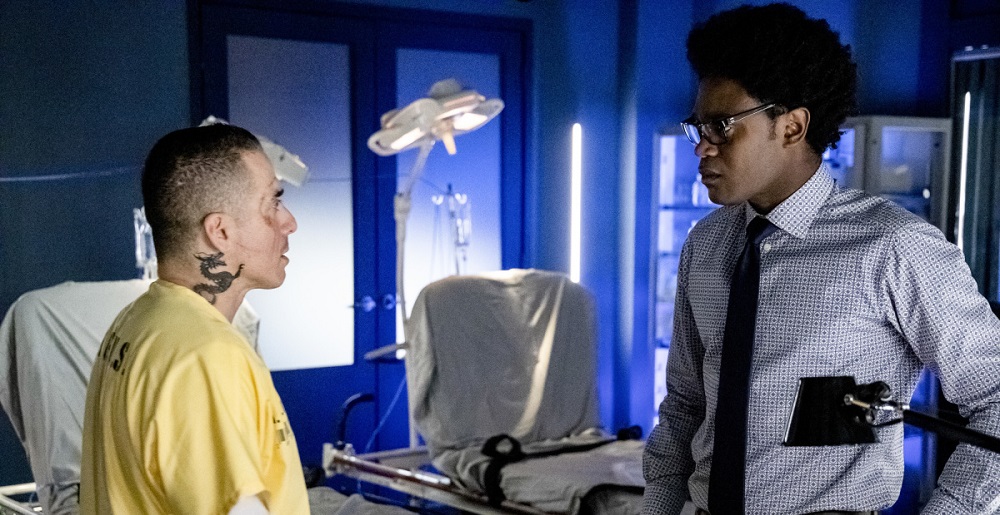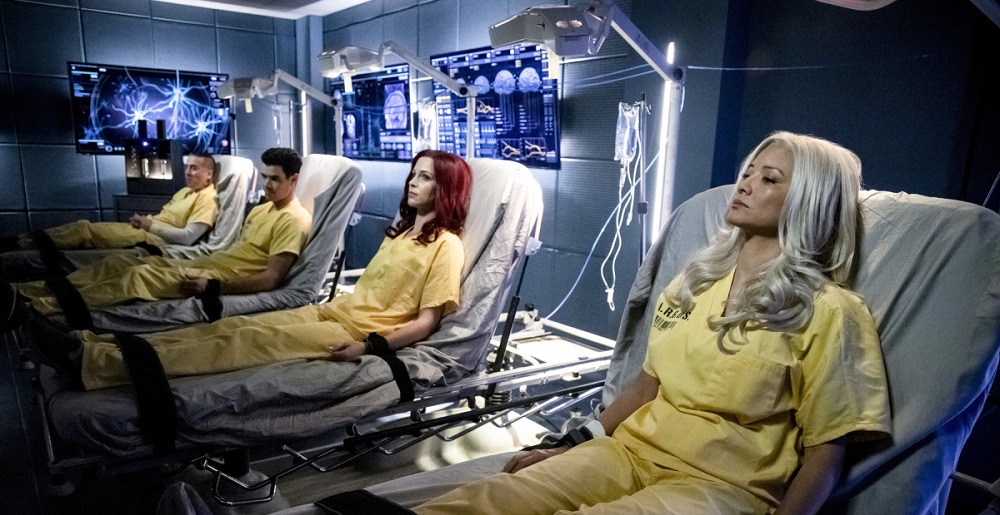Director: David Ramsey
Writer: Onalee Hunter and Tonya Kong
Starring: Stephen Amell, David Ramsey, Emily Bett Rickards, Echo Kellum, Juliana Harkavy, Kirk Acevedo, Sea Shimooka, Katie Cassidy, Peter Graham-Gaudreau, Audrey Marie Anderson, Kelly Hu, Liam Hall, Nelson Wong
Synopsis: While Oliver’s attempts to connect with Emiko are made more complicated by another of his father’s sins, Curtis struggles with Diggle’s decisions, and Laurel is stalked by a face from her past.
Positives: David Ramsey, our own John Diggle, makes his directorial debut and he does not disappoint in this very emotional episode. The themes of transparency, atonement, and integrity evenly feed into each other amongst its three subplots.

This week Oliver is attacked on multiple fronts and again they have to deal with the crimes of Robert Queen. I recently rewatched the season three flashback scene in which Oliver viewed his father’s video message to him. His confession that he had deceived himself into believing everything was for his family and belief that Oliver could be better than he was resonates through his son’s actions this week. Having both his conversation with Emiko at the gravesite set against his later broadcast interview about transparency is brilliantly arranged. It also sets up Laurel’s subplot which we will discuss later. Sea and Stephen’s onscreen chemistry feels very natural and believable. What enhances the verisimilitude is Emiko, initially dead set against connecting with her half-sibling, is motivated to consider it in light of Oliver’s actions this week. The writers shine this week by shedding light on the one other victim of the Queen’s Gambit sinking that Oliver has only discussed with Thea and with Barry: David Hackett, the bodyguard whom Robert shot off the raft before turning the gun on himself. Comic book fans remember the surname as that of the man who threw Oliver Queen overboard in Andy Diggle’s Green Arrow: Year One. The way they brought this issue up in the Level Two episode and made it a generational vendetta made the most sense.
It also shows how much Oliver has grown as a person, both when he tries to talk Sam down from electrocuting those officers and when he publicly addresses this on camera. The premise is also reminiscent of a recent storyline in the Green Arrow comic with an antagonist called Citizen. Stephen conveys the sincerity needed in his admitted remorse over his own negligence in this situation. In his crusade, he had forgotten about all injured parties and I am honestly surprised that no one has even thought about the other crew member until now. What enhances this tragedy is the discovery of evidence that Sam, now an electrical engineer, has been searching for his father since the boat sank. The fact he was a loose end that Oliver had left hanging for so long is a “Damn it” moment that is not lost on the audience. Luke Camilleri’s performance as Sam is perfect in that you can see the anguish and pain in his eyes. His character is understandably unhinged and feels betrayed by a family whom his father worked for. The confrontation in the police station – very clever modus operandi, by the way – works in that Oliver is portrayed as calm and sincere by the second person this week making him bear his father’s sins. No arrows, no hood. This is also growth because the old Oliver from season one would not have hesitated to putting an arrow in Sam’s chest. He genuinely tries to reach Sam, a gesture that wins over the SCPD in the process. While he could not redeem Sam, the silver lining in the collateral damage is a chance at connecting with his half-sister, which I hope will allow for the explanation for her archery and martial arts prowess.

Diggle’s new Suici– sorry, I mean “Ghost Protocol” may not be as spiffy as Harley Quinn or El Diablo, but it’s a brilliant way of bringing back past antagonists like Cupid, played by Amy Gumenick, and Kelly Hu’s China White. The irony, of course, is that it’s again a ploy on Diggle’s part to justify the removal of Ricardo Diaz from incarceration to get information on Dante. Curtis is given his time in the spotlight as the biggest naysayer of Team Arrow, and, in turn, the voice of the audience. He is emerging as the conscience of A.R.G.U.S. and quick to point out more humane ways of achieving their goals. The “escape” of Diaz and “murder” of Curtis was a great cliffhanger that fooled the audience…until the pixels form around Diaz and brings him back to the starting line. Mr. Terrific channels his inner Felicity this week with snark and cyberspace and outsmarts The Dragon. The writers have had Curtis both work with and clash with Diggle this season the most, and he is that he is quickly emerging as the one with the guts to hold John’s feet to the fire with his intentions. Diggle is indeed skating near a very fascistic line, especially since the Ghost Protocol is going forward in spite of Curtis’s efforts. Kellum’s sternness in Curtis’s declaration of intent to his superior is a good restrained righteous anger that we haven’t seen from him before. It’s a side that we don’t normally see with Felicity’s bestie, and it parallels with Rene’s frustrations over the dissolution of Team Arrow. Both are uncomfortable with the new status quo, and it’s going to be interesting if they are forced to team up against —- ok I’m saying it anyway —- Suicide Squad 2.0.
Finally, we come to the continuation of the redemption of Earth-2 Laurel Lance with a ghost from her past. What’s also evolving is the friendship that’s blossoming between her and Felicity, the equivalent of a buddy-cop arrangement. The reappearance of a face she had left behind on Earth-2, and the trauma it genuinely inspires in the stone-cold Black Siren gives Katie some good material this week. Her emotional retelling of how Earth-2’s Brett Collins was both the cause of her father’s death and, thus, her first kill as Black Siren following her empowerment reveals her survivor’s guilt. This is the first time I’ve seen her cry since Quentin’s death last year, and Katie conveys a strong woman having a vulnerable moment magnificently. It genuinely hurts Laurel because it is the face and the act that sent her down the path of Black Siren, a path she’s tried very hard to get off of for Quentin. She’s genuinely shaken because it’s a reminder of what she’s done, and where her self-hatred comes from the most. Nothing feels forced, and neither does Emily’s show of support as Felicity. What makes this stalker plot work is Peter Graham-Gaudreau’s characterization of Earth-1’s Collins as one very similar to the man Laurel killed. The writers are wise in their decision to make this plot carry over to Dinah at the end of the episode, turning this anti-vigilantism movement not reserved to only one individual. It also reflects on the poll that saw 75% wanted Oliver to resign his deputization by the SCPD. It brilliantly extends this case of mistaken identity and sets up an ongoing subplot with the potential to link up with any of the others.
Negatives:

Arrow — “Past Sins” — Image Number: AR711b_0285b — Pictured (L-R): Kirk Acevedo as Ricardo Diaz, Liam Hall as Kane Wolfman, Amy Gumenick as Carrie Cutter/Cupid and Kelly Hu as China White — Photo: Jack Rowand/The CW — é 2019 The CW Network, LLC. All Rights Reserved.
There are only a few complaints I can think of this week, starting with the introduction of the new Squad not going beyond two minutes, given the antagonists’ history on the series. This is understandable given that they would need an episode devoted to them alone to bring out their full potential. That and also the CW’s deliberate effort to not use the terms “Task Force X” or “Suicide Squad” even though they’ve already been used on the series before. Lastly, Curtis is closest to Felicity besides Diggle and Oliver, so why did we not see him voice outrage at the fact that this development involving Diaz has to be kept secret? It just seemed out of character since he saw firsthand how pursuing Diaz on her own had made Felicity extremely ruthless. I hope that this will be addressed in later episodes.
Final Verdict:
I give this a solid 5 out of 5. This was a strong character-driven installment that saw past sins revisited and protagonists forced into positions they didn’t plan on. David Ramsey’s first outing as a director was stellar, as all subplots were given equal attention and nothing was overlooked or underplayed. Oliver’s efforts to redeem his family name and reach out to Emiko are keenly felt thanks to Stephen’s performance. After delivering episodes conveyed through prose and physicality for several years, having the focus shifted to emotional delivery is a challenge for both Stephen and the writers to keep the audience engaged. As more about Laurel’s history is revealed, it aids in the effort to redeem this former villain and push her more towards inclusion in Team Arrow. And of course, the internal conflict between Diggle and Curtis over the new Squad will make for great stories.
